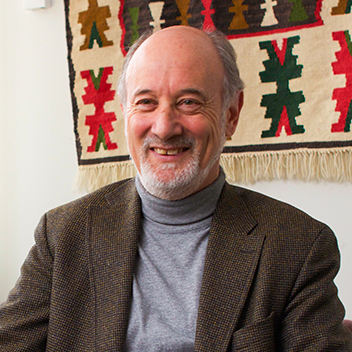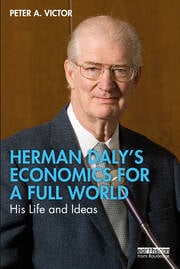Retirement is not slowing growth for Professor Emeritus Peter Victor; in fact, the ecological economist who is best known for his influential book Managing Without Growth, is busier than ever with a new book on economist Herman Daly and an active research agenda.
By Elaine Smith
Peter Victor may have stepped down from his academic responsibilities at York University, but the professor emeritus and former dean of the Faculty of the Environmental Studies (now Environmental and Urban Change, or EUC) is still busy with writing and research. Late November 2021 saw him launching his latest book, Herman Daly’s Economics for a Full World: His Life and Ideas (Routledge, 2022), and he regularly publishes research papers with colleague Tim Jackson, director of the Centre for the Understanding of Sustainable Prosperity (CUSP) at the University of Surrey, United Kingdom.
Homage to an innovator
His new book grows out of the great respect he has for his subject as an innovator in economics. Daly, a professor emeritus at the University of Maryland, is known for establishing ecological economics – Victor’s field of study – as a discipline, although one that had to fight for recognition, because, unlike most other strains of economics, it doesn’t mandate growth. In essence, it is a stream of economic thought that emphasizes the value of natural capital, recognizing the limits of natural resources. Proponents believe that economic prosperity can be gained through improving the quality of life, rather than just pure market growth.

“I knew Daly’s work quite well,” says Victor. “I kept telling my wife that someone should write a biography of Herman Daly, given his influence on economics, and she said, ‘You should do it.’ I have learned over the years that it’s worth listening to her suggestions. I contacted Herman and he agreed, as long as I placed the emphasis on his ideas and debates about economics.”
Before putting pen to paper, Victor spent a week interviewing Daly at his home in Virginia and another 18 months going through the economics literature to review Daly’s work and what others had to say about it. Finally, he spent the spring and summer of 2020 “writing the biography sitting on my front porch.”
“Ecological economists question how economies can keep growing if the world is not,” says Victor. “The uptake of our theories has been disappointingly slow. Challenging economic growth doesn’t make you popular with mainstream economists. Most of the teaching and research in this field is done outside economics departments – at York’s EUC, for example.
“One of the reasons I wrote the Daly biography is to get people engaged with the ideas and a different world view. It’s exciting stuff.”
Much of Victor’s research revolves around economic modelling, which isn’t easily understood by the layperson. However, the Daly biography is different.
“Vibrant, timely and thoroughly accessible, Peter Victor’s elegant new biography charts the life and work of a genuine radical,” notes CUSP’s Jackson in praising the work. “Daly’s steady-state economics marked a turning point in economic thinking with revolutionary implications. From polio survivor to World Bank advisor, Victor paints a sympathetic and long overdue portrait of an extraordinary man with extraordinary ideas.”
Slow growth no disaster
It’s not Victor’s first foray into authoring a book, although it is his first biography. He is also well known for his seminal work in ecological economics, Managing Without Growth: Slow by Design, not Disaster, which he has recently updated for a second edition. It grew out of a series of discussions he had with his former PhD supervisor about economic growth. If endless economic growth is infeasible and, in advanced economies, also undesirable, what are the possibilities for living well without relying on growth?

“You can’t produce unless you take energy and materials from nature and create waste,” says Victor. “If we are going to reduce our impact in physical terms, economies cannot grow without limit despite the fact that growth of the economy is usually measured in terms of money. However, even without growth, inequality can be reduced, high levels of employment can be maintained, and technology can improve, allowing people to work less and live better.
“I wrote the book because human impacts on the planet have become excessive, and I used a lot of data, so it wasn’t just about abstract ideas. I built a simulation of the Canadian economy so people could explore their own scenarios. I wrote the book because it was interesting. However, I had no idea what would come of the book.”
Serendipitously, it was released just as the 2008 recession struck and, suddenly, Victor was invited to speak about his ideas all over the globe. “Otherwise, it might have been obscure,” he said.
For someone whose varied career has seen him successfully as a consultant, an assistant deputy minister, an educational administrator and a professor, perhaps it’s not surprising to find that whatever endeavour Victor undertakes, acclaim and knowledge follow. Especially with the shadow of climate change becoming larger each day, don’t expect him to stop contributing to our understanding of the natural world.


